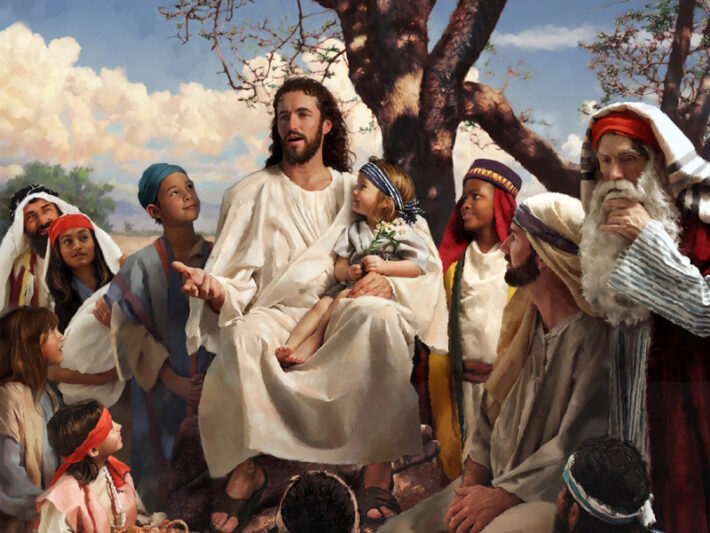Matthew 9: 14-15 – Friday after Ash Wednesday (King James Audio Bible, Spoken Word)
14 ¶ Then came to him the disciples of John, saying, Why do we and the Pharisees fast oft, but thy disciples fast not?
15 And Jesus said unto them, Can the children of the bridechamber mourn, as long as the bridegroom is with them? but the days will come, when the bridegroom shall be taken from them, and then shall they fast.
Many of the Jews of Christ’s time, including the disciples of John the Baptist, followed complicated rituals of fasting and purification, elaborated to the point where they could obscure genuine piety. It is noted that the followers of Christ do not follow such rituals. This must have seemed particularly strange to the followers of John. After all, John foretold Christ’s coming and saw that he was the Messiah as he began his ministry. Later, John’s uncertainty is such that he will send from prison to ask Christ if he is indeed the one who is to come. The reality of Christ present and the manner of his ministry must have been confusing and troubling to the Jews.
In reply, Jesus presents a radical overturning of Jewish orthodoxy. He is not come to patch an old garment with new cloth or to place new wine in old bottles. Christ’s message is not merely a tinkering with or adjustment of the old ways of the Jews. Instead, the salvation he brings involves a complete regeneration. His presence is a challenge to discover our true relationship with God.
Christ declares himself as the bridegroom. His followers are the ‘children of the bride chamber’, the sons of the house where the wedding is celebrated, the bridegroom’s closest friends. Our union with Christ is the wedding. We are Christ’s bride. In the Gospel of John (3: 28-30), John the Baptist affirms this, saying, as being himself the friend of the bridegroom:
28 Ye yourselves bear me witness, that I said, I am not the Christ, but that I am sent before him.
29 He that hath the bride is the bridegroom: but the friend of the bridegroom, which standeth and heareth him, rejoiceth greatly because of the bridegroom’s voice: this my joy therefore is fulfilled.
30 He must increase, but I must decrease.
Christ foretells his being taken away from his followers and says that then they will fast, just as Christ himself has fasted during his forty days in the wilderness. So we too fast as we await the coming banquet. Our ways of fasting should, then, be true to the simplicity of faith Christ gives to us, and true not to ritual or empty observances but to our genuine longing to be with Christ in the life to come.
Lord God, help me to see how fasting helps me to recognize that my true longing is for you and that no amount of food or drink can satisfy it.

![]()
King James Audio Bible | Endnotes
How is Jesus the Bridegroom?
The dialogue between Jesus and the disciples of John the Baptist in Matthew 9:14-15 reveals much about Jesus’ mission and identity. The disciples’ question about fasting highlights their adherence to Jewish traditions and practices, and their expectation that Jesus’ disciples should follow suit. However, Jesus’ response challenges their assumptions and reveals his role as the bridegroom of a new covenant.
Jesus’ use of the bridegroom metaphor is significant for several reasons. First, it positions him as the central figure in a wedding celebration, a joyous occasion associated with the coming of the kingdom of God. This is a marked departure from the somber and penitent practices of fasting that the disciples of John the Baptist and the Pharisees observed. Jesus’ emphasis on celebration and feasting is consistent with his broader message of the coming of the kingdom of God, which he often described as a banquet or a wedding feast (see, for example, Matthew 22:1-14).
Second, the bridegroom metaphor also suggests a deeper level of intimacy and connection between Jesus and his followers. In Jewish tradition, the image of God as a husband or lover to Israel was a common one, emphasizing the covenantal relationship between God and his people. By invoking this imagery, Jesus is inviting his disciples and followers into a similar relationship of intimacy and commitment to him.
Third, the bridegroom metaphor foreshadows Jesus’ ultimate sacrifice on the Cross. Just as a bridegroom willingly gives himself up for the sake of his bride, Jesus will give his life for the salvation of humanity. The Garden of Gethsemane, where Jesus prayed before his crucifixion, is a poignant reminder of this sacrifice. In Gethsemane, Jesus experienced profound anguish and turmoil as he faced the weight of what lay ahead of him. Yet, in his submission to God’s will, he demonstrated the depth of his love for us and his commitment to his mission as the bridegroom.
The Parable of the Prodigal Son is relevant to the themes in Matthew 9:14-15, particularly in its portrayal of forgiveness and reconciliation. The wayward son’s return to his father represents the possibility of repentance and restoration, even for those who have strayed from God’s path. In this sense, the parable highlights the transformative power of Jesus’ message and the invitation he extends to all to become part of the wedding feast.
The broader context of Jesus’ teachings and ministry is relevant to understanding Matthew 9:14-15. The Sermon on the Mount, for example, provides a blueprint for the new covenant that Jesus came to establish. In the Sermon on the Mount, Jesus emphasizes the importance of internal attitudes and motivations, such as humility, mercy, and purity of heart, over external practices and rituals. This emphasis on the heart aligns with the bridegroom metaphor and underscores the depth of relationship and commitment into which Jesus invites his followers.








